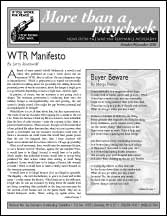The other night I was in the kitchen, alone in the house, when a large rat tripped the trap in the laundry room. The trap seized around the rat’s neck without snapping it, and the rat thrashed around in agonized panic.
My first thought, once I realized what all the racket was about, was to hope that if I just waited it out, the trap would quickly kill the rat. After some more horrible sounds came from the laundry room, I began to feel sorry for the rat and contemplated rescuing it and releasing it outside (though while still really hoping it would just die). I considered also just retreating back upstairs and hoping the problem would resolve itself in my absence; maybe one of my housemates would come home to the scene and think it was their problem.
Instead I went back to the laundry room to investigate. The rat by then was dead — or dead-ish anyway; it was hard to be certain. I picked up the trap, opened the back door, and by swinging the trap while releasing the spring, jettisoned the rat body to drop with a thud on the porch. It did not move, but I still didn’t trust that it was dead, and didn’t want to pick it up in case it would choose that moment to spring back to life.
“I’ll just leave it there for now, and if it’s still dead in the morning I’ll deal with it then,” I thought, though in the back of my mind I think I was still hopefully imagining one of my housemates coming home, stumbling upon the corpse, and dealing with it, or maybe a larger predator coming along and dragging the body away.
An hour or two later I finally faced up to the rat being my responsibility to deal with and went downstairs to collect the body, but by then it was gone. I think it hadn’t been so dead as it had looked after all.
The terrible thing about all this squeamish dithering is that it was going on the same night that I was finishing The Blood of Others and my Picket Line post on the book and thinking:
Other examples of bad faith reasoning include going upstairs and hoping the problem goes away, hoping your housemates take the responsibility off your hands, or approvingly watching one of them set rat traps around the house while at the same time being willing to pretend to yourself that you’re concerned about the pain and suffering of a trapped rat.
Which I guess goes to show that fully-engaged, conscious living is hard, and that habits of bad faith thinking are hard to break, even if you set your mind to it. If I flailed and dithered so much in dealing with a rat in a trap, when all that was really at stake was my squeamishness, how might I expect myself to behave when the stakes are higher and the temptations more intense?
Later that night I shamefacedly admitted to my housemates how I’d handled the situation. That, I hoped, would be the sort of negative feedback that might help train my will better. Next time maybe I can slice through the temptations and distractions and just straightforwardly do what needs doing.

